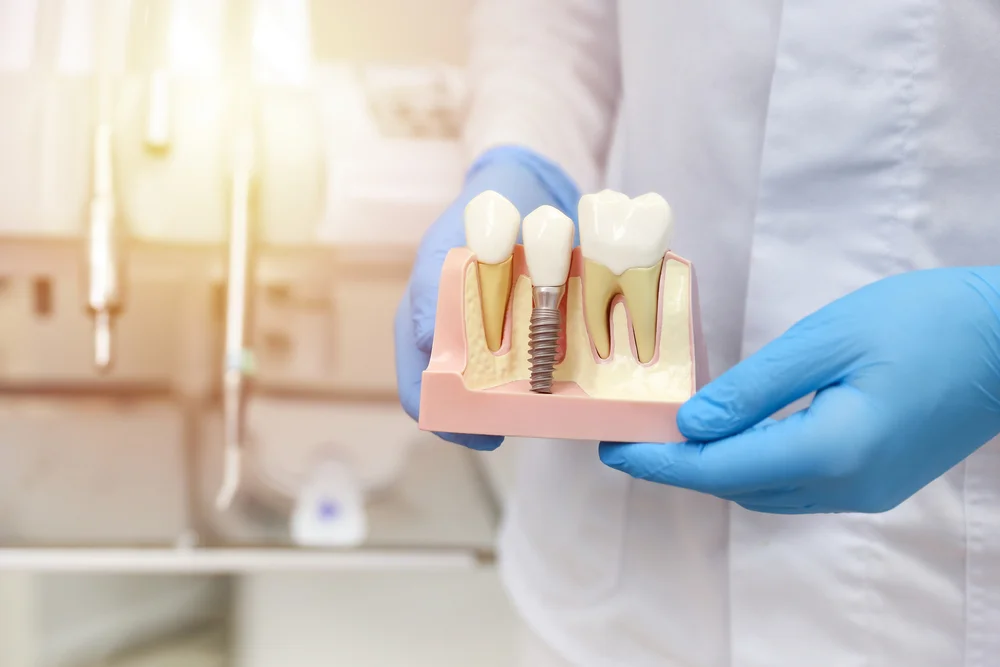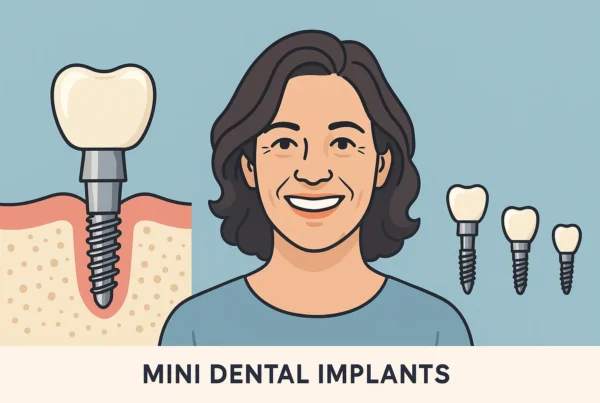Understanding Dental Implant Failure: Causes and Solutions.
Dental implants are one of the most effective and long-lasting tooth replacement options available today. Yet, like any medical procedure, they are not immune to complications. While the vast majority of dental implants succeed, some do fail—and understanding the causes of failure can help patients and providers take proactive steps to prevent it. Implant failure can be immediate or develop over time, influenced by factors that range from surgical technique to patient lifestyle. By examining these variables, we can uncover ways to extend implant life and improve outcomes for future patients.
Failures can be grouped into three primary causes: procedural complications, patient-related factors, and external influences. Each of these categories plays a distinct role in shaping the longevity and success of dental implants. Whether you’re preparing for implant surgery or already have implants in place, this breakdown will offer valuable insight into how to protect your investment and maintain long-term oral health.
Procedural Complications
The foundation for implant success begins in the dental chair. Surgical precision, implant material quality, and site preparation are all non-negotiable components of a successful procedure. Errors during any of these steps—be it misalignment, overheating of bone during drilling, or improper angulation—can prevent the implant from integrating with the jawbone, a process known as osseointegration.
Surgeon experience and technology also matter. An inexperienced provider may fail to recognize subtle anatomical challenges, while outdated tools may not offer the precision needed for accurate placement. For this reason, patients are encouraged to ask about their surgeon’s training, success rates, and whether they use 3D imaging or guided surgical protocols to enhance outcomes.
Patient-Related Factors
What happens after surgery is just as critical as the procedure itself. A patient’s general health, immune response, and habits can all affect healing and implant integration. Smokers and tobacco product users, for example, face significantly higher risks of implant failure because nicotine restricts blood flow, reducing the body’s ability to heal and fight infection.
Chronic health conditions such as diabetes or autoimmune disorders may also delay healing and affect bone density—two key contributors to implant stability. These conditions don’t necessarily preclude implant success, but they do require additional precautions and monitoring. Patients with such risk factors should work closely with both their dental team and primary care providers to develop a comprehensive care plan.
External Circumstances
Even the best surgical technique and patient compliance can’t eliminate all risks. External influences—things that happen beyond the clinic—can impact implant longevity. One of the most common culprits is poor oral hygiene, which can lead to plaque buildup, gum inflammation, and infections like peri-implantitis.
Physical trauma is another factor. A blow to the face from a sports injury or accident can disturb the implant’s positioning or damage surrounding bone and tissue. A grinding habit can also create excessive pressure on implant teeth over time. Dentists often recommend custom mouthguards for athletes or those who grind to provide an extra layer of defense against high force impact.
Identifying Early Implant Failure: What Goes Wrong
Early implant failure typically occurs within the first few months following surgery. It’s often the result of the body rejecting the implant or improper healing due to procedural or health-related factors. There are three primary causes to watch for:
- Bone Quality: A jawbone lacking adequate density or volume may be unable to hold the implant securely. This condition can often be addressed with bone grafting prior to implant placement.
- Surgical Precision: Inaccurate placement or excessive pressure during surgery can impede healing or lead to mechanical instability. The use of digital imaging and surgical guides reduces these risks significantly.
- Patient Behavior: Behaviors such as smoking, poor oral hygiene, or neglecting post-op instructions can impair healing and trigger inflammation or infection. Patients must understand that their choices directly impact implant success.
Recognizing these risks early on allows for corrective action, whether it’s delaying implant placement, adding bone support, or adjusting post-op care.
Understanding Peri-Implantitis and Late Failure
While early failures happen shortly after surgery, late-stage failures may emerge years later—often silently and progressively. One of the most significant causes of long-term failure is peri-implantitis, a bacterial infection that affects the soft and hard tissues surrounding the implant.
- Bacterial Infection: Plaque accumulation can lead to bacterial colonies forming around the implant, causing inflammation that breaks down bone over time. This type of infection often lacks early symptoms, making regular dental checkups vital.
- Poor Oral Hygiene: Infrequent brushing and flossing allows plaque and bacteria to flourish. Without intervention, this weakens the implant’s support structure and can lead to mobility or complete failure.
- Gum and Bone Health: Even patients with great oral habits may be at risk if their gums and jawbone are not monitored. Ongoing evaluations ensure that tissue health is maintained and any deterioration is caught before it progresses.
By maintaining a vigilant hygiene routine and adhering to regular dental visits, patients can minimize their risk of long-term implant complications.
Actionable Response or Strategic Solution
If an implant shows signs of failure, swift action can make a meaningful difference. There are several pathways to resolution depending on the stage and severity of the issue:
- Immediate Treatments: Deep cleanings below the gum line, localized antibiotics, and minor surgical interventions can address early-stage infections or tissue irritation.
- Assessing Viability: Dentists will evaluate whether the implant remains stable and whether the surrounding bone and soft tissue can still support it. If so, conservative treatments may be enough to restore function.
- Long-Term Alternatives: If the implant cannot be saved, it may be removed and replaced after the area has healed. In some cases, patients may opt for alternative prosthetics, such as bridges or removable dentures.
Collaborating closely with your dental provider to develop a customized response plan is essential. Every implant failure scenario is unique and requires thoughtful evaluation.

Decision Criteria or Escalation Triggers
Knowing when to escalate treatment is vital to preserving overall oral health. Certain signs serve as red flags that warrant immediate attention:
- Implant Movement: Any noticeable shifting or instability suggests the implant has not fully integrated with the bone. Immediate imaging and clinical assessment are required.
- Persistent Pain: Discomfort that doesn’t subside after initial healing may indicate underlying infection, pressure points, or structural failure.
- Bone Loss: Subtle bone loss often goes unnoticed without X-rays, but even small changes can destabilize the implant over time. Annual radiographs are an essential part of monitoring implant health.
Reacting quickly to these signals increases the chance of saving the implant—or at least preserving the site for future treatment.
Support Resources or Professional Guidance
The journey to successful implant treatment doesn’t end after surgery. Access to the right support and guidance can help patients prevent problems or address them promptly if they arise:
- Educational Resources: Dental practices should provide clear, accessible instructions on daily implant care, symptom monitoring, and what to expect after surgery.
- Routine Professional Care: Scheduled visits for cleanings and checkups ensure early detection of complications. Many implant failures are preventable when caught in time.
- Personalized Advice: When complications arise, individualized treatment plans help patients make informed decisions. A collaborative relationship with your dental team is key.
Being proactive and informed makes all the difference in maintaining long-term implant health.
Preventive Measures or Best Practices
Preventing implant failure is always better than treating it. These core practices can dramatically increase your chance of long-term success:
- Initial Assessment: Pre-surgical evaluation of oral health, bone density, and medical history helps customize treatment to reduce risks.
- Precise Surgical Technique: Experienced surgeons using modern tools and planning technologies are more likely to place implants that last.
- Advanced Technology: Innovations like 3D cone beam scans and digital surgical guides enhance precision and reduce human error.
These best practices reflect the blend of clinical skill and technology that drives modern implant success.
Take The Next Steps
While no medical treatment comes with a guarantee, dental implant success is highly achievable with the right preparation, care, and follow-up. Patients should not be discouraged by the possibility of failure but instead be empowered to take a proactive role in their care. Working with a knowledgeable dental team and adhering to their guidance makes a substantial difference.
Ultimately, implant care is a shared responsibility. The dental professional brings surgical expertise and diagnostic skill; the patient contributes daily care and self-awareness. When both sides commit to that partnership, the likelihood of long-lasting, complication-free implants increases significantly.
Don’t wait any longer for the smile you’ve been dreaming of. Contact Elaine Wu ReNEW Dental in Tewksbury, MA today! Call 978-451-1500 or visit our website to schedule your consultation.
Schedule your consultation today!
FAQs
What should I do if my dental implant feels loose or painful?
Unusual movement or discomfort around your dental implant could be a sign of early failure. Contact your dentist immediately for evaluation and possible intervention.
How can I prevent my dental implants from failing?
Maintaining excellent oral hygiene—brushing, flossing, and getting regular professional cleanings—is key to preventing infection and implant failure.
Can a failing implant be saved?
Yes, in many cases. Dentists may treat infections, adjust the implant, or perform bone grafts. If saving the implant isn’t possible, a replacement or alternative restoration may be recommended.
elated Articles
- Dental Implants
- Same-Day Dental Implants
- Affordable teeth implants
- Dental implants surgery
- Dentures with implants
- Full Mouth Dental Implants
- Mini Dental Implants
- Zirconia Dental Implants
See More Reviews From ReNew Dental Denture and Implant Center. View information about local places in our community. Get Driving Directions to Our Practice
If you’d like to get an estimate on your dental implants, take our implants quiz here.




